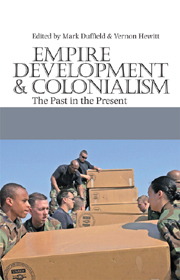Book contents
- Frontmatter
- Contents
- Acknowledgements
- Notes on Contributors
- Introduction
- 1 The Exceptional inclusion of ‘Savages’ & ‘Barbarians’
- 2 Empire, International Development & the Concept of Good Government
- 3 Empire: a Question of Hearts?
- 4 ‘Conflict-Sensitive’ Aid & Making liberal Peace
- 5 Development, Poverty & Famines
- 6 Plain Tales from the Reconstruction Site
- 7 The International Politics of Social Transformation
- 8 Liberal Interventionism & the Fragile State
- 9 Freedom, Fear & NGOs
- 10 Theorising Continuities between Empire & Development
- 11 Spatial Practices & Imaginaries
- 12 Decolonising the Borders in Sudan
- 13 ‘Individualism is, Indeed, Running Riot’
- Index
9 - Freedom, Fear & NGOs
Balancing Discourses of Violence & Humanity in Securitising Times
Published online by Cambridge University Press: 05 February 2013
- Frontmatter
- Contents
- Acknowledgements
- Notes on Contributors
- Introduction
- 1 The Exceptional inclusion of ‘Savages’ & ‘Barbarians’
- 2 Empire, International Development & the Concept of Good Government
- 3 Empire: a Question of Hearts?
- 4 ‘Conflict-Sensitive’ Aid & Making liberal Peace
- 5 Development, Poverty & Famines
- 6 Plain Tales from the Reconstruction Site
- 7 The International Politics of Social Transformation
- 8 Liberal Interventionism & the Fragile State
- 9 Freedom, Fear & NGOs
- 10 Theorising Continuities between Empire & Development
- 11 Spatial Practices & Imaginaries
- 12 Decolonising the Borders in Sudan
- 13 ‘Individualism is, Indeed, Running Riot’
- Index
Summary
Introduction
This chapter aims to explore an approach for analysing NGOs' roles in securitisation seen as a form of global governmentality. In recent years, most notably since 9/11 and the so-called ‘global war on terror’, many writers have noted that global security concerns have changed both in shape and in intensity (Abrahamsen 2004; Duffield, 2002; Higgott 2003), entering many different dimensions of political and economic life (Elbe 2004; Eriksson 2001), and with a range of new or transformed actors (Bislev et al. 2001; Leander 2006; Waever 2000). Didier Bigo (2002:63) has combined these insights with a Foucauldian governmentality analysis arguing that, in Europe, ‘a continuum of threats and general unease’ is created through and around immigration, not by a particular speech act by a particular governmental actor, but by the consonance of global structural trends with the legitimating moves of a range of political actors, and the technological apparatus and expertise of transnational security personnel:
Securitization, then, is generated through a confrontation between the strategies of political actors (or of actors having access to the political stage through the media), in the national political field, the security professionals at the transnational level (public and private bureaucracies managing the fear), and the global social transformations affecting the possibilities of reshaping political boundaries.
(Bigo 2002:75)Securitisation therefore becomes a form of globalised governmentality, operating through but also across national, regional and global scales.
Many writer shave specifically commented on the ways in which NGOs have become linked into increasingly complex relationships with governments, and with the arts of government.
- Type
- Chapter
- Information
- Empire, Development and ColonialismThe Past in the Present, pp. 130 - 145Publisher: Boydell & BrewerPrint publication year: 2009



